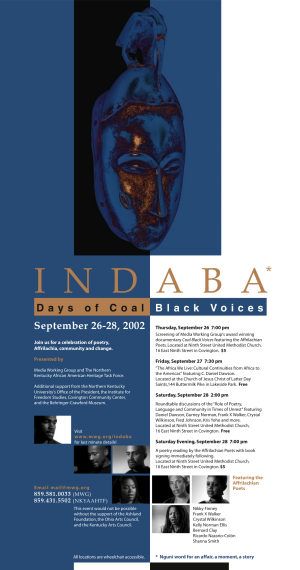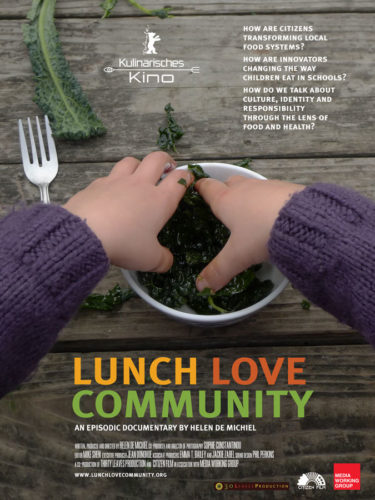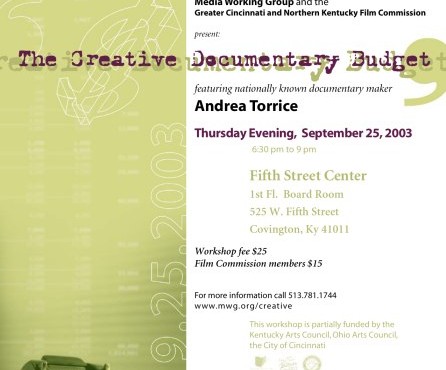Highlights of Public Engagement
From our beginnings in 1987, Media Working Group’s commitment to democratic participation in media is grounded in an understanding that art and literature are rich sources of authentic experience, that can foster transformative communication and social understanding between cultural groups and across political boundaries.
Film Talk is a series of salon-like screenings that gives a time and space for filmmakers to screen work, talk with a targeted audience and otherwise socialize with their community.
Trees in Trouble Filmmaker Andrea Torrice’s extensive public engagement campaign for her film using a printed guide called Taking Root, A Community Guide for Protecting the Cincinnati Region’s Urban Forest. Panel discussions, screenings, trainings, and c0-presentations were in collaboration with organizations such as OKI, the University of Cincinnati, Cincinnati Public Schools, the City of Cincinnati’s Department of the Environment, the Park Board, the Cincinnati Zoo, forestry managers, arborists and conservationists.
Coming to Ground From its inception project producers have worked with farmers, farm policymakers, advocates, food and farm bill strategists to shape the message of the film. From this grassroots start we are now circulating the film to Grange Halls, farm organizations, SlowFood chapters, and Regional Bioneers chapters to hear what people have to say, listen to their questions and suggestions. Engagement activities remind us of why we make documentary films.
Local Voices, Local Needs, a series of short advocacy documentaries designed for Internet and cable distribution produced with local government officials and their attorneys, these videos addressed the negative public interest impact of Congress’ failed attempt at national telecommunications legislation in 2006; it was produced as an component to a successful campaign to stop draconian deregulation of the telecommunications industry, summer of 2006.
Indaba: Three Days of Coal Black Voices In 2002, MWG conducted a three-day gathering of artists, students, educators, community activists, and Black churches utilizing the film to create dialogue during a period of racial tension in Cincinnati.
From 2003 through 2008 MWG led a national civic engagement campaign for The Gender Chip Project documentary directed by Helen De Michiel and funded by the National Science Foundation. The Gender Chip Project’s civic engagement campaign, training, and attached materials are designed for adults who are supporting girls (mentors, professional development people, teachers) in their pursuit of study and careers in STEM in spite of gender inequity. That project has reached more than 250 organizations across the country from the Girls Scouts, USA in New York, the Exploratorium in San Francisco, to the National Girls Collaborative Project in Seattle.
Media Working Group’s association with the BBC’s Community Programmes Unit with the films Death on Delivery, Future On the Line and Hybrid City represented ground breaking work in early participatory media and democratic access to broadcasting.
Hybrid City is a documentary project created with Architects and Designers for Social Responsibility, broadcast on BBC 2’s long running Open Space Series in 1992. Hybrid City looks at the politics of urban space in the emerging global city and asks what urban planners and architects must do to address the issues of access to the city. [View Clip]
Death on Delivery is a documentary produced with and for Britain’s Campaign Against the Arms Trade in 1990. Fred Johnson, while at the BBC’s Community Programme Unit on a Fulbright Scholarship, worked with the Campaign to write a narration performed by actress Glenda Jackson. When aired on BBC 2’s Open Space it was highest fundraising event ever experienced for the Campaign Against the Arms Trade.
Open Studio: The Arts Online, 1998-2000, a national initiative of the Benton Foundation and National Endowment for the Art, Open Studio set Media Working Group on a three year engagement marathon to provide Internet access, strategic communications and training to artists and arts organizations ensuring the communications environment of the 21st century thrives as a source of creative excellence and diversity. This project featured training workshops, website hosting and design assistance and the convening of strategic communications planning session over a three state region. All done with a wide diversity of partners and collaborators throughout Ohio, Kentucky and Georgia.
AFL-CIO Labor Council Media Arts Residency, a year-long arts residency with the Cincinnati Labor Council, and the first ever funded by the Ohio Arts Council. It was designed to build community alliances and dialogue between the labor movement and the region’s minority and ethnic communities. Partners included the Midwest Asian American Foundation, A. Philip Randolph Institute, Urban Appalachian Council, Midwives Care, Midwifery Associates, The Cincinnati Arts Consortium, numerous local labor unions, and churches. During this residency Media Working Group mounted the first George Stoney Retrospective, a week long celebration of Stoney’s ground breaking social documentaries.






